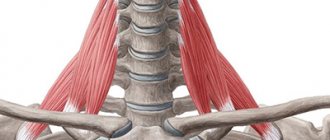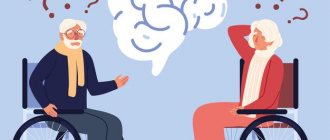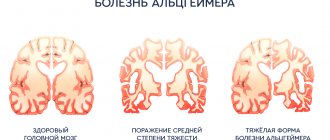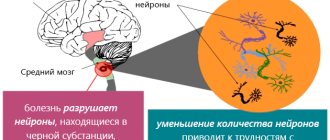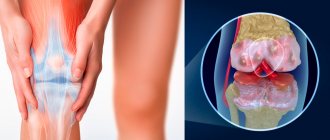With age, people begin to notice that their memory is not as good as before, and it becomes more and more difficult to concentrate on any task. The absent-minded state can go away on its own as stress is overcome, or it can be one of the symptoms of pathology - Alzheimer's disease.
The diagnosis was first described in detail in 1906. The disease affects the nervous system, causes the death of brain cells, and is chronic. This is one of the causes of dementia (senile dementia). According to Rosstat, in Russia more than 44 million people constantly live with this problem.
Timely diagnosis and proper treatment can significantly slow down the development of pathology and preserve the patient’s quality of life for a long time. In our clinic you can undergo the necessary examinations. MCB doctors will confirm or refute the diagnosis, advise on prognosis, and help you choose the treatment that is right for you.
Causes of the disease
There is no exact answer to the question about the causes of the pathology. Early-onset Alzheimer's disease may first appear before age 65 and is hereditary. Such cases account for about 5% of the total. If anyone in the family has already been diagnosed, you should seek advice from a geneticist.
Late-onset Alzheimer's disease is more common. The disease affects older people over the age of 65. The pattern of development of the pathology has not been identified. Although the essence of Alzheimer's disease is well known, it is impossible to say exactly why one person suffers from the pathology, while another maintains a clear mind even in old age.
According to the global Alzheimer's Association, several genes have been discovered that increase the risk of developing the disease:
- APOE allele e4 (risk gene) - every fourth case;
- determining gene (heredity, autosomal dominant Alzheimer's disease) - less than 1% of cases, only 1 confirmed diagnosis in the world.
Scientists suggest that the state of the nervous system is influenced by heredity, the environmental environment, and the patient’s lifestyle. The main risk factor is age. Other causes include midlife depression and smoking.
At the same time, a healthy lifestyle, proper nutrition, and regular physical activity have a beneficial effect on the body’s condition, but do not exclude the development of Alzheimer’s disease. Decades before the first symptoms appear, pathological changes already begin in brain cells. Amyloids and tau proteins are formed in tissues, blocking the function of nerve structures. Gradually, non-functioning cells die.
Other possible reasons:
- cardiovascular diseases;
- diabetes, excess weight;
- elevated cholesterol levels;
- hypertension;
- traumatic brain injuries.
Pathogenesis
According to modern understanding, dementia of the Alzheimer's type is predominantly caused by genetic factors. The following genes are known to be responsible for the development of this disease:
- the gene encoding the precursor of amyloid protein (chromosome 21);
- presenilin-1 (chromosome 14);
- presenilin-2 (chromosome 1);
- the gene encoding apolipoprotein E-4 (chromosome 19).
Carriage of the first three genes listed guarantees almost 100% the likelihood of developing Alzheimer's disease between the ages of 40 and 65 years. The latter gene increases the risk of developing degenerative pathology after the age of 65 by 2 times.
The triggering of the disease is caused by a violation of the metabolism of the amyloid protein precursor, which under normal conditions is broken down into particles of equal size. In the case of genetic defects, it splits into fragments of different lengths. The latter do not dissolve and are deposited in the brain tissue, as well as in the walls of blood vessels, in the form of plaques that cause the death of neurons.
Symptoms of Alzheimer's disease
The first sign of pathology is often memory impairment. The patient forgets names and faces, and it becomes difficult to find the right word in a conversation. When a person begins to notice memory deterioration with age, this is rarely paid attention to, associating the changes with the aging of the body. Gradually, the necrosis of brain cells spreads, and difficulty in performing daily activities is added to forgetfulness: cleaning the house, washing clothes, preparing food, etc.
In people engaged in intellectual work, symptoms of Alzheimer's disease appear later. Their brains are better able to adapt to change. In the early stages, the pathology may manifest itself as difficulty in choosing words during speech, difficulties in orienting in familiar terrain. Later, a noticeable decrease in memory occurs.
Other characteristic symptoms include:
- difficulties understanding spoken speech and written text;
- personality changes noticeable to close people;
- violation of the concept of time;
- difficulties with writing texts.
As Alzheimer's disease progresses, it turns into severe dementia, and the manifestations of the pathology vary from person to person.
Features of the course of the disease
In the early stages of Alzheimer's disease, the patient himself becomes aware of memory problems and tries to cope with them and carry out everyday activities. Diagnosis of pathology at this stage gives the most favorable prognosis. If a person does not notice deterioration, close people can help him with this.
As the pathology develops, obvious changes in the patient’s behavior are observed:
- often repeats itself in conversation, tells the same story several times;
- forgets answers to previously asked questions and asks them again;
- while going to the store, makes spontaneous purchases and acquires a lot of unnecessary things;
- spends more time on household chores and copes poorly with his daily responsibilities;
- loses the ability to learn, cannot acquire new knowledge and skills, for example, cannot cope with a new door lock;
- more often suffers from depression, apathy, refuses to meet with friends and go on visits;
- devotes less time to his appearance, allows sloppiness and sloppiness in his wardrobe.
Against the background of previous behavior, new habits are clearly visible, even if the patient first tries to hide his problems from others. Over time, the ability to self-criticize is lost, and memory loss becomes obvious. The patient begins to forget the names and faces of family members, does not remember his own last name, and loses orientation in space and time. An older person with late-stage Alzheimer's disease may no longer be aware that anything is wrong with them. Basic self-care skills disappear; assistance is needed when eating, going to the toilet, and changing clothes. Periods of clarity of consciousness occur less and less often.
Diagnosis of Alzheimer's disease
When the first symptoms appear, you should consult a general practitioner, family doctor or neurologist. The patient is recommended to come to the appointment with a relative who can describe changes in behavior from the outside. The patient cannot always adequately assess his condition and often does not tell the doctor important facts.
Diagnostic procedure:
- Anamnesis collection. The doctor finds out what kind of life the patient leads, finds out his habits, place of work, what illness he had, and whether there is any family history.
- Analysis of clinical symptoms. You need to talk about your complaints and observations. The specialist will ask how long ago and with what intensity the symptoms of the disease have been increasing. It is better to keep a diary of observations from the first changes and show it to the doctor at the appointment.
- Assessment of the patient's condition at the time of consultation. The doctor conducts a cognitive test for attentiveness, memory, ability to navigate in space, and perform tasks. When assessing the actual condition, the patient’s level of education and the presence of concomitant pathologies, for example, hearing impairment, are taken into account. Tests such as the Mini Mental State Examination (MMSE) are used to determine the degree of dementia.
At the first appointment, a primary diagnosis of Alzheimer’s disease is carried out according to the algorithm described above and additional examinations are prescribed:
- General blood test and hormone levels. Based on the results, the doctor determines the presence of other diseases that can cause memory loss, for example, thyroid dysfunction, anemia, vitamin deficiency and others.
- Blood test for infections, HIV, syphilis. Treatment of diseases will help improve memory and get rid of other disturbing symptoms.
- Consultations with doctors of other specialties. To correctly diagnose Alzheimer's disease in the elderly, a conclusion from a geriatrician, psychiatrist, or neurologist may be required.
- Magnetic resonance or computed tomography of the head. The images show brain tissue and structures. Based on the examination results, pathologies such as hydrocephalus, stroke, and neoplasms are excluded.
- Neuropsychological examination. Patients with early-onset mild dementia undergo special tests to find out what type of memory impairment is present.
A comprehensive analysis of the examination results allows us to establish a diagnosis.
Traditional criteria for Alzheimer's disease:
- clinically confirmed dementia;
- impairments in 2 or more cognitive areas;
- preservation of consciousness;
- gradual decline in memory and other functions;
- age after 40 years;
- absence of brain diseases and systemic pathologies that can affect the functioning of the nervous system.
The National Institute for the Diagnosis of Age-Related Alzheimer's Disease guidelines also list characteristic biomarkers:
- beta-amyloid proteins in the brain, visible on PET scans;
- low levels of beta-amyloid and increased levels of tau protein in the cerebrospinal fluid;
- local atrophy of the temporal lobes and medial parietal cortex on the tomogram.
Treatment of Alzheimer's disease
The earlier neurodegenerative changes are detected, the more effective the treatment. The therapy will preserve the patient’s intelligence and memory for a long time. Changes slow down, the patient and his family have time to adapt to the new way of life.
To treat the disease, drug therapy and measures to improve brain activity are prescribed. Depending on the patient’s condition, medications are selected to stabilize the mental state, to maintain the functioning of nerve cells (increasing the number of neurotransmitters, inhibiting cholinesterase), to eliminate concomitant pathologies.
To preserve intelligence, patients are recommended to:
- engage in creativity;
- actively carry out daily activities with other family members;
- communicate with friends and relatives;
- care for flowers in the garden or pets;
- increase physical activity (long walks in parks, walking, dancing, classes in groups for older people, etc.);
- play musical instruments, sing, etc.
Constant communication helps a person maintain attention, speech, and the ability to understand other people. Close relatives are advised to be patient and not show irritation from the patient’s forgetfulness or from his sometimes inappropriate remarks and questions. In order for a person to better understand the speech addressed to him, he needs to speak in short, simple phrases.
It is important to maintain your usual lifestyle as much as possible. If the patient was involved in painting or sports before diagnosis, he should continue to the best of his ability. Positive emotions have a beneficial effect on the health of the nervous system.
The disease progresses slowly. After diagnosis, a patient with high-quality drug support can live for many years. Late-stage Alzheimer's disease cannot be cured. The average life expectancy after immobilization is 6 months. Palliative care is indicated.
Healthy lifestyle
The answer to the question of whether Alzheimer's can be prevented through regular physical activity and proper nutrition will be clear and positive. Compliance with the usual principles of a healthy lifestyle makes all human organ systems more resistant to damage by various pathologies. The same applies to the circulatory system and the central nervous system, violations of which lead to the development of the syndrome. Therefore, measures to improve overall health are also great for preventing Alzheimer's.
- Regular exercise. Physical exercise helps prevent the development of pathologies of the cardiovascular system and brain. Particularly noteworthy is the benefits of yoga, which, in addition to maintaining physical health, also has a positive effect on a person’s mental state.
- Proper nutrition. You should eat small meals about 5 times a day. The diet should consist of vegetables, fruits, dairy products, lean meat, herbs and nuts. It is better to prepare dishes by steaming or baking. Minimize the consumption of fried, fatty, salty, spicy foods and sweets, which do more harm to the body than good.
- Good dream. Daily sleep should be at least 8 hours. The quality of sleep at night and during the day varies, so replenishing the lack of sleep through daytime rest will not be effective.
- Quitting smoking and alcohol. Eliminating these bad habits from your life helps prevent the onset of disease.
- Avoiding stress.
- Taking vitamins. Substances such as vitamin E (5 milligrams daily) and B vitamins can help prevent Alzheimer's disease.
Prevention of Alzheimer's disease
The medical community has not yet provided convincing data. Prevention of Alzheimer's disease essentially comes down to eliminating precipitating factors.
The risk of developing pathology is reduced in the following cases:
- maintaining intellectual stress in old age: solving crossword puzzles, mastering new skills;
- prevention of hypertension;
- maintaining good physical shape;
- lowering blood cholesterol levels;
- proper nutrition including foods rich in saturated fats and omega-3 fatty acids.
What influences the development of Alzheimer's disease?
1. Age
is the strongest factor in the development of Alzheimer's disease.
According to various estimates, about 13 percent of people over 65 years old
suffer from dementia.
Women suffer from it somewhat more often. Scientists explain this by the longer life expectancy of the fairer sex. Many men simply do not live to see the development of Alzheimer's disease. 2. Lifestyle
. A growing body of research into Alzheimer's disease has linked the disease to lifestyle factors such as obesity, diabetes, high blood pressure and elevated cholesterol. As a rule, these factors are the consequences of a sedentary lifestyle and unhealthy diet.
Prevention of dementia
Learn how to prevent cognitive decline by avoiding bad habits and getting outside for walks and runs.
3.
Education
. Research shows that Alzheimer's disease is less common among educated people. Scientists say that reading, analytical work and memory training are suitable for preventing the disease.





